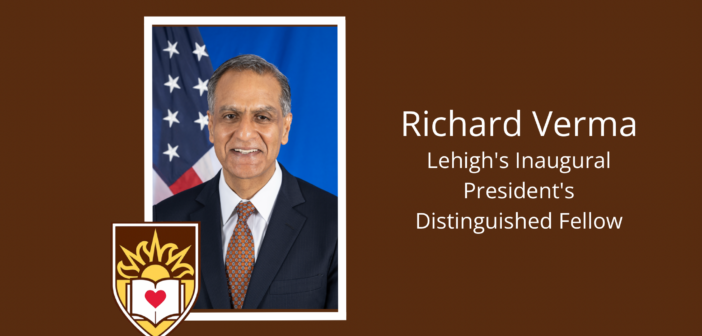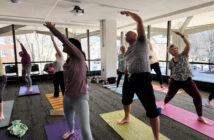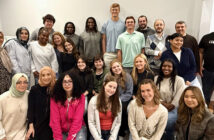Lehigh announced on Jan. 29 that Richard Verma, ‘90, would be appointed the Inaugural President’s Distinguished Fellow.
Verma is the former United States Ambassador to India and former U.S. Deputy Secretary of State of Management and Resources. He has also held previous appointments as the Assistant Secretary of State for Legislative Affairs and the National Security Advisor to the Senate Majority Leader. As a veteran of the U.S. Air Force, he received the Meritorious Service Medal and Air Force Commendation Medal.
Verma began his role as the President’s Distinguished Fellow on Feb. 1. Within this position, he will “mentor students, lead discussions on key national and global issues, deliver a public lecture and share his insights on leadership in complex times,” according to Lehigh’s announcement. He will do so by visiting Lehigh’s campus in Bethlehem and programs in New York City and Washington D.C.
A reporter for The Brown and White staff sat down with Verma to discuss his experiences throughout his career in the U.S. government and his plans as the Inaugural President’s Distinguished Fellow at Lehigh.
Q: Could you describe your position as the former U.S. Deputy Secretary of State for Management and Resources?
Richard Verma: If you think about the different cabinet agencies, there’s going to be a secretary of energy, secretary of labor, secretary of transportation and, in our case, a secretary of state. There’s typically one deputy. That person reports to the secretary and, when the secretary is gone, is the acting secretary.
In the State Department, we are the only agency that has two deputies. We have a deputy for policy and a deputy for management and resources. I was the deputy for management and resources, which means I was the chief operating officer for the State Department. I ran the day-to-day operations overseeing the budget, personnel, spending and operations around the world. We’ve got 80,000 people around the world in 300 locations. I also picked up a bunch of other responsibilities along the way (including) Ukraine economic reconstruction, the climate team and Afghan relocations. I also had the U.S. (and) Mexico bilateral relationship, and the U.S. (and) India bilateral relationship. It was a big, interesting and complicated role at a challenging time in the world.
Q: What were some of the biggest challenges you faced in this role?
RV: I think some of the biggest challenges were that the State Department and the United States Agency for International Development (USAID) had been underfunded and understaffed for many years, so trying to get that level set.
Obviously, we had the war in Ukraine. We had the situation in the Middle East and the terrorist attacks on Oct. 7. But, then we also had all these other challenges that were relatively new — the challenge of artificial intelligence and advances in technology, the disruption from climate change and the biological threats and pandemics.
So, it was trying to make sense of all of this, because so much of it rested on the State Department and diplomats to try to go out and figure out the solutions of how we were going to cooperate and work together globally. I spent a lot of time on what we called “modernizing the State Department.”
I’ll give you a couple examples. We set up a new Bureau on Global Health Security after the pandemic. It would make sense that you would have a new bureau of the State Department focused on health security following a pandemic. We set up a new Bureau of Cyber Security and technology exactly for all the huge advantages that come with our advances in technology but also addressing the risks that come if you don’t have the rules in place. We set up new training in climate science and climate change. We set up new training in AI and critical minerals and all of these issues that were coming across people’s inboxes. That was a fun thing to work on, so that your people who are out there across the world, wherever they happen to be, meeting those challenges head on with the capability to do so and really advocating for America’s and our partners’ interests.
Q: You mentioned working with the U.S. Agency for International Development (USAID), do you have any comment on the recent shutdown of this department?
RV: There’s a bipartisan consensus on the importance of what we’re doing around the world, especially in the development category. If you read the 9/11 commission report, the after action report about the attacks on the U.S., it talks about the importance of engaging with the world, being out aggressively again, advancing U.S. interests, engaging with populations around the world and not seeding the field to adversaries. So, yeah, I think this is going to be a challenging situation.
If you just look at the number of people around the world who are going to be impacted, I would just say, honestly, look at the work that USAID does to open markets, to work on energy transition, to assist governments (to) become better partners with U.S. companies and U.S. people. The other thing I always tell folks when they say, “Well, the American people don’t want this,” I say, “Whenever a Peace Corps volunteer goes home, or a USAID officer goes back to their high school, or a foreign service officer goes back to their college or high school or to a rotary club dinner, they are so warmly welcomed, and they get standing ovations from their classmates or their neighbors. There’s a line out the door of people wanting to ask them questions.” I think we shouldn’t forget about that part of America’s goodness as well. Yes, we should be pursuing our self interests and national interests, but the American people are really proud, I think, of what our foreign service and development experts have done around the world for decades, oftentimes in exceptionally dangerous situations. Hundreds of USAID and State Department personnel have been killed in very dangerous conditions serving alongside our military and intelligence agencies.
I think when you go out in the field, you don’t see the divisions you might see in Washington D.C. You don’t see people stovepiped and saying, “Oh, we’re the military, we do this. We’re the State Department, we do this. We’re in the USAID, we do this.” Everyone’s working together in a team. So, I’m concerned about having half of the team on the field and not the full team.
There is a great quote from (former) Secretary of Defense (Jim) Mattis who talks about, “If you don’t fully fund the State Department and USAID, you’re going to have to buy me more bullets because they do conflict prevention.”
Q: What were the biggest challenges you faced as U.S. Ambassador to India, and how did U.S. relations with India change throughout your term?
RV: We were (in India) from December 2014 to January 2017. If you know anything about our India relations, you know it’s been up and down for 75 years. We were so lucky we hit it in an upward point — a very strong upward point.
Prime Minister (Narendra) Modi and (former) President (Barack) Obama became good friends during my two and a half years. They met 11 times. We had three summits. The president came to India twice. The Prime Minister came to Washington (D.C.) twice. He addressed a joint session of Congress. There was just so much happening in the relationship, and it was generally very positive. Every meeting between the two heads of state created 50, 60, 70 things, literally, that we would then work on for those next few months until the next meeting. And so that was really, really promising, and it gave us a chance, finally, to break out of the historical hesitations that we had with each other. During the Cold War, we weren’t close, we weren’t really partners in anything. So we had to almost rebuild all of our relationships in defense and trade, and people-to-people ties. And so we saw each of those happening. I think just making sure that we, as Prime Minister Modi said, really did overcome those hesitations of history, we put in place the building blocks. So it was an honor and a gift to be there. Frankly, it was just something you can’t ever predict you’re going to get asked to do, and I’m grateful that I had that chance.
I will say for me personally, my dad came to the U.S. in 1963. As he reminds us, he showed up in New York City with $14 and a bus ticket. I’ve heard that story thousands of times, right? But he tells us that to remind us, “Hey, we started with nothing, so you better work hard.” But I don’t think he ever imagined that his kid would be going back to India as the U.S. ambassador. That’s a lightning strike that’s winning the lottery, but it’s also a very American story, very American dream. And honestly, Lehigh was a big part of that, and also just being in the right place at the right time and being really lucky. But that was a real honor to go back and see where my dad grew up, go back and see where my mom grew up, and go see where my mom and grandmother taught school to young girls.
Q: Do you have any experiences at Lehigh that may have shaped this journey?
RV: Lehigh was rigorous for me because I studied engineering. I wasn’t a great engineering student. I minored in international relations and that was much more comfortable to me. I wanted to be an astronaut, and so I was in hardcore engineering. A couple things happened. One, I wasn’t very good at it. But two, I also started working in Washington (D.C.) that first summer after Lehigh. I worked for my member of Congress. I was doing well in my liberal arts courses, and less well in the more technical courses. I remember walking into the Air Force ROTC detachment commander’s office at the end of sophomore year. And I said, “I really think I should go to law school,” and “I don’t think this astronaut thing is going to work out.” And so we all pivoted. And again, the military was right there to support me. This is another lesson I tell younger people. I say, “What you’re really interested in and what you’re good at may not always overlap.” And so you have to find that intersection of passion and talent, and the Lehigh days did that.
The other thing I’d say about Lehigh is just that I had a great group of friends there, still do. And I think that notion of standing with each other and standing alongside and helping people out — I really felt that at Lehigh. It almost sounds corny to say, but the Lehigh family has been with me every step of the way.
If you would have told me, “You’re going to be on the alumni association board of directors, you’re going to be a young alumni trustee, you’re going to be a corporate trustee for five years, you’re going to give the commencement address in 2019 and now you’re gonna be this Presidential Fellow in 2025,” I would have said, “That’s not plausible,” but here we are, and it’s so great.
Q: What does your new role as the Distinguished fellow entail?
RV: Me, President (Joseph J.) Helble and the Provost, we thought, “Is there a way to give back to students, engage with faculty and staff by mentoring, teaching and guest lecturing periodically?” We kind of envisioned three different areas of emphasis.
One would be just kind of more traditional international affairs and foreign policy and what’s happening in the world. What’s different? Why do things seem so complicated and challenging? Where are the opportunities? What are the tools that we have? So that was track number one.
Track number two was really more about Washington (D.C.) and Congress and national security. How does it work? Why does it not work on many days? So more of a more traditional Washington focus.
Then, number three was about leadership in foreign affairs, leadership and policy, leadership and national security. What are some lessons that I’ve seen in leaders around the world or in Washington (D.C.) that would be interesting to pass on? Both are things that have really been great to see and some things that are more concerning to see about leadership. Then, President Helble said, “What do you think?” and I said, “This sounds great.” So, we also built in multiple visits to campus. We’re going to do at least one day in New York, if not more. We’re going to do a day in D.C. We’re also going to try to get a group of students who are interested in meeting on a regular basis. That can be on issues, it can be on careers, it can be on just whatever people want to talk about. So that’s the idea. It’s not overly structured. My first day on campus is Feb. 27.
Q: What advice would you give to a current Lehigh Student?
RV: I would say you’re studying at a great place at a really interesting time in the world. There is so much opportunity. People are living longer. People are learning more. More people are rising into the middle class. People are traveling more. The world’s connected, but you’re also entering the world at a really complicated place.
The U.S. can’t just show up and pound its fist on the table and say, “This is the way it’s going to be.” We now have rising powers from all over the world who want a voice. We have countries saying, “You wrote the rules in the 20th century. This is now the 21st century, we’re going to write some rules too.” You have the speed of change, because the innovation, the development of new technologies, and new approaches and discovery is happening so quickly. That’s really exciting and also really challenging.
So, I just think it’s a great time to be interested and aware of what’s taking place around you, because you can’t disconnect yourself from it. What’s happening in our world around us will impact what’s happening here. I think if we, and I say “we,” I really mean, if all of you are able to go out and work with your friends and partners and develop key relationships, you can really make this world and this century a more peaceful, more prosperous, more humane century for everyone. So, no pressure on all of you, but I think you’ll all be graduating in a really dynamic and exciting time.






Comment policy
Comments posted to The Brown and White website are reviewed by a moderator before being approved. Incendiary speech or harassing language, including comments targeted at individuals, may be deemed unacceptable and not published. Spam and other soliciting will also be declined.
The Brown and White also reserves the right to not publish entirely anonymous comments.